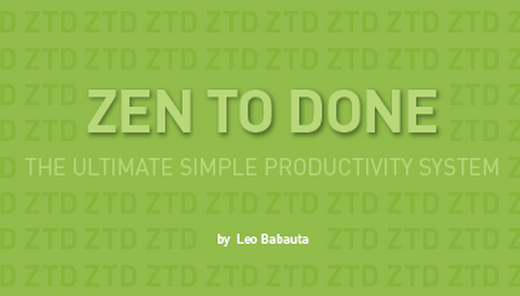GTD for Academics: Acquiring the Habits

Before rebooting this blog earlier this month, I began a series on the Getting Things Done ("GTD") productivity philosophy and how it applies to those who work in academics. It's time to continue our exploration of this important idea. Here's a summary of what we've covered so far:
- In the first post, I wrote about "setting the stage" --- why a person in higher education would need to have some kind of system for dealing with the "stuff" in their life in the first place. Briefly: We need it, because there is so much work to do in academia and it's all so varied, that without a system in place, we end up buried by it, and our lives soon become incapable of holding all the things that make it worth living.
- In the second post, I wrote about the characteristics of a system that really works for academics: Any sort of organized way of dealing with our "stuff" has to be simple, platform/tech-independent, always on, integrated, agile, and actually helpful. I pointed out that two of the most common "systems" employed by college faculty --- to-do lists and email --- fail to live up to our needs, and this set the stage for GTD specifically.
When I was writing these posts, I had this big idea of eventually collecting them and putting them into some sort of e-book form called "GTD for Academics", that would serve as a guide to go along with David Allen's book about how to apply the principles of GTD to the everyday lives of college faculty. But I discovered something wonderful over Thanksgiving break: This book has already been written. And it's great.
It's called Zen To Done: The Ultimate Simple Productivity System by Leo Babauta.

You may know Leo Babauta from his excellent blog Zen Habits, where he writes about minimalism and living a full and intentional life. Zen To Done, or "ZTD", is his marriage of David Allen's GTD philosophy along with ideas from Steven Covey and others. It's a satisfyingly compact book at just 114 pages; I read it in one sitting back over Thanksgiving break. Although it's not specifically aimed at academics, this book is perfect for people in academia: it's a quick read but full of ideas, and the GTD variant that Leo spells out is simple, flexible, and scalable (you can make it as simple or as complex as you want), and it retains all the best parts of David Allen's original GTD. I consider GTD and ZTD to be different names for the same thing, but ZTD takes a different approach to implementing it in your life.
In fact I think what makes ZTD so well-suited for academics is that you can phase it into your life gradually and practice GTD with great effectiveness without having to dive in all at once (which is where most newbies get overwhelmed and quit). There's even a stripped-down version he calls "Minimal ZTD" for absolute beginners.
In fact the premise of ZTD is that it is to be implemented gradually as a set of 10 habits, adopted one at a time --- or 2-3 at a time at most, and not necessarily in order --- practiced over and over again until they become truly habitual. I'm going to give general descriptions of these habits now, and in future posts I'll write about my current practice for exercising each one, so you'll have some concrete examples.
- The Collect habit. In this habit, you engage in ubiquitous capture: carrying around a notebook and a pen, or a voice recorder, or smartphone, or something else into which you can put any task, idea, project, contact, or anything else you think about that comes into your head. Why do this? So that you don't keep it in your head. This is a key element of David Allen's original GTD methodology: You do not keep things in your head, because while the human brain is marvelous for processing information, it's terrible for storing it; better to have a way of taking information that crosses your mind and getting it out of your head into external storage --- paper, electronic, whatever --- so you can look at it later. GTD is predicated on the Capture habit. Babauta recommends that newbies begin just by doing this, over and over again until it becomes habitual.
- The Process habit. This is where you take the stuff that you captured and decide what to do with it. This includes making decisions --- quick decisions! --- about what to do with the stuff in your physical and email inboxes, the stuff lying around the office that doesn't seem to be in the right place, the scraps of paper or electronic notes you made, etc. GTD methodology specifies that we process stuff in our inboxes top-down and either do it now, if it takes 2 minutes or less to do; then delete it if it's of no use; then delegate it if someone else is better situated to get it done; then file it away if it's not immediately pertinent (but might be in the future); and then when all else is done, either put it in a Next Actions list or on the calendar. (Much more on this habit in a later post.)
- The Plan habit. Here we habitually engage in regular planning for how we are going to use our time. Babauta recommends creating a list of "Big Rocks" each week --- items that really need to get done this week, named after the image of filling a bucket with large and small stones and realizing that if you don't put the big rocks in first, they'll never fit in once the small stuff is put in. And then, on a daily basis decide what the 1--3 most important things ("MIT's") are for the day and making sure to get those done first, early in the day.
- The Do habit. This is a habit that you won't find discussed much in David Allen's GTD philosophy --- the habit of doing just one task at a time without distractions. Select a task, either an MIT or the next action for a project, and shut off all distractions and all other tasks until it's done, without multitasking. This is more of the "Zen" part of ZTD.
- The Simple Trusted System habit. To keep track of the massive amount of stuff that we have captured and processed, we need to have a simple trusted system that holds all of it. David Allen has a way of thinking about this using Next Actions lists and contexts for work, phone, etc. Babauta adds to this the importance of keeping the system as simple as possible --- simple lists that are checked daily. This habit means not fussing around with new tools constantly[1] but finding the simplest, most frictionless way to get information into and out of your system as possible. We'll have a lot more to say about that in a future post.
- The Organize habit. This habit involves the same thing I tell my kids every day: Everything has a home and needs to be put away into that home. Here we create a home for everything: incoming electronic stuff, incoming physical stuff, stuff lying around your office, etc. Keep your workspace clear so that your mind is kept clear and you can focus on the Do habit.
- The Review habit. One of the most important aspects of GTD (and ZTD) is the habit of the weekly review, where you devote time to review your system and your goals and all the information that is in your system and how it relates to your goals. This takes 60-90 minutes but probably saves hours of time later that would be wasted because what you're working on has no real direction or connection to everything else. Also in this habit is the habit of larger, more infrequent reviews where you go up to a "high altitude" and examine your big-picture goals.
- The Simplify habit. Another element unique to ZTD is the habit of reducing your goals and tasks down to the minimal essentials. This is the habit of paring back what you are doing, whenever you do a review. See also Greg McKeown's excellent book Essentialism: The Disciplined Pursuit of Less.
- The Routine habit. This habit has to do with the power of simple routines, developed and practiced consistently to provide a framework for your life and work. Many academics think they have routines (teaching Mondays/Wednesdays/Fridays, etc.) but in fact we often live completely unstructured lives. This is actually one of the perks of being an academic but it has to be handled with care and discipline lest we end up wasting the time we have. The Routine habit is about setting up daily, weekly, etc. scheduled times for specific tasks in a way that frames your work and makes it easier to get things done.
- The "Find Your Passion" habit. Finally, this habit is about constantly seeking out work and activity that is personally meaningful to you. This is surprisingly hard for academics, which is ironic. After all, we got into our respective fields and earned advanced degrees in them because we were following lines of inquiry we were passionate about, right? Well, in everyday academic life, we all know that that initial passion gives way eventually to the reality of work: committees, advising, etc. The thing is, we can derive great pleasure and satisfaction from these aspects of our work if we choose them properly and adopt the right mindsets toward them. But that takes work, and that's what this habit is about.
Leo's "Minimal ZTD" consists of just the Collect, Process, Plan, and Do habits. This is for people who want the absolute minimal framework of productivity, and I would say people who do even this much and make these truly habitual are going to be amazed at how it affects them.
The ZTD book goes into much more depth on each of these ten habits and also includes some encouragement on how to form those habits. Namely, you have to commit yourself, then practice, find ways to keep yourself motivated, track your progress, seek support, give yourself rewards, stay focused and think positively. I think this is crucial advice, because success in getting your life and work in order is a matter of behavioral change, and many academics are just too proud to do this. That's why they're so busy all the time.
In future posts, rather than start from scratch on these ten habits, I'm just going to strongly encourage you to buy Leo's book and read it --- it's short, and cheap! --- and then I'll be posting (as part of the Tuesday Sanity Check series) about how I implement all these habits myself and make it work for me. Stay tuned!
My personal challenge to you: Go buy Leo's book and read it, or at least the first half of it, before lunchtime tomorrow.
I am super guilty about doing this because I like fussing around with technology in general. But this is also where GTD newbies fail --- they identify GTD with the tools, and they tend to jump right to this habit before building the habits of capturing, processing, planning, and doing. ↩︎


